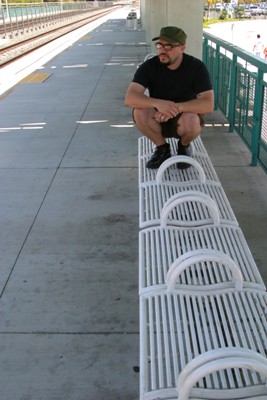
Interview and photographs by Michael Knott
Rick McDonough has been my friend for many years now. He’s helped me record several projects including the All Indie E.P., Struck Last May – 16 Flowers, the latest Windy Lyre record. He is also currently playing on – and engineering – the new L.S. Underground record, as well as my next solo release entitled Even Star. In the meantime, Rick has found enough time to record his first solo album under the name of Hidden From Blackout entitled Breakups and Fur Coats.
M: So let’s get right to it then, what does Hidden From Blackout mean?
R: The Hidden From Blackout name came from a P.J. Harvey record where she says “I was in need of help, hidden to blackout” and it just struck me at the time. It was actually my favorite song on the record. I remember the song had these sparse verses with piano panned left and right, and then went into this glorious big sounding chorus with vocals that would wrap around and embrace you. It made me take notice and left me wanting more, and then “hidden to blackout” just evolved into Hidden From Blackout. I’m sure all the kids are listening to P.J. Harvey these days, aren’t they?
M: I know you’ve been doing music for many, many years and been in several bands over the years. How long have you actually been doing music?
R: Since I was 13. I saved up enough money to purchase my first guitar, an acoustic Gibson Hummingbird knock-off. I was so proud of it even though it had a bend in the neck and would buzz on the 4th and 12th frets. I think I handed that guitar down to my brother, eventually.
M: You’re from the D.C. area, isn’t that right?
R: Yeah, I always say Washington D.C.
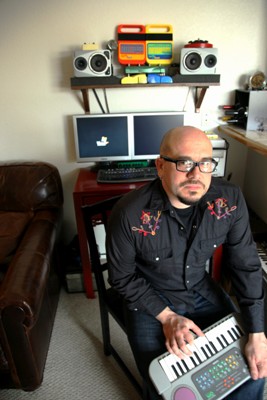 M: What is that the proper way, the east coast way, or is it like calling San Francisco “Frisco?” Why do you specify Washington D.C.?
M: What is that the proper way, the east coast way, or is it like calling San Francisco “Frisco?” Why do you specify Washington D.C.?
R: Technically, I’m from Arlington, Virginia, but I don’t really want to associate myself with a cemetery right now.
M: Yeah, not yet. I may soon, but not you.
R: No, when I first came to Southern California, while going to university, people would ask where I was from. The first few times I proudly announced “Arlington, Virginia”. I started getting questions like “why don’t you speak with a southern accent?” and “do your parents fly the rebel flag?” I quickly realized that the people I was interacting with had no idea where Arlington actually was. Sure, its south of the Mason-Dixon line, but it’s still a suburb of D.C. I proceeded to tell people I was from Washington D.C., instead, which sounds quite different to those who may be more geographically challenged. Anyway, it’s all about perception I suppose.
M: Yeah. So, the title of the record is Breakups and Fur Coats. That’s got a really nice ring to it, what is that all about?
R: It pretty much just came to me one day in the fall. It was overcast and chilly out, and I tend to get reflective and sentimental when the weather’s like that. I was thinking of a friend’s relationship, which led me to consider a former relationship of my own. Anyway, I decided to call this instrumental song that I was working on that day “Breakups and Fur Coats.” The emotion I was trying to convey though the music was that of one attempting to achieve comfort, kind of like me wanting a fur coat that autumn day. I know it’s kind of cheesy, but what are you going to do? Cheese is good in moderation anyway. Well, a few months down the road I decided the title deserved something more, and it ended up as the name of the record instead. Amid momentary frustrations, pains, challenges, and struggles that can come upon us there is always comfort if you seek it out. If you can grab a hold of your perspective and search for positive and comforting things, such reassurance is waiting for you like a big, warm, comfortable fur coat.
M: Great. Well, obviously I’ve heard the record, I love it, and you were kind enough to ask me to mix it with you, so thank you.
R: No, thank you.
M: Let’s move on, what kind of music would you call your stuff, or how would you describe it?
R: That’s a good question. I suppose every musician struggles when attempting to classify his own music, or put it into a category and box it up. I kind of see it as a melancholy cinematic experience but with the visual aspect playing out in your imagination. I would describe it with words like emotional, reflective, melodic, fluid, and textured. It’s emotional and I think it evokes emotion. It’s got hints of indie, emo, ambient, lo-fi, down-tempo, alternative, ambient, but yet it’s not specifically any of these styles either. With most of the songs on this record I started out writing on guitar, and then they evolved from there. I would often deconstruct them and build them back up on electric guitar. There are vocals on some of the songs, but they play more of a supportive role a lot of the time as opposed to being the emphasis. It’s not like they are completely buried in the mix, but they are more like another instrument carrying out their melody, playing their part towards the whole.
M: I think it’s so surreal and dissident. It really has so many different layers and diverse emotions going on at the same time that overlap and are nicely interwoven within each other. I think if people slow down and soak in it that they will just love it.
Ok, so who in the WASHINGTON D.C. area influenced you and the way you perceived music when you were growing up? Is there one band from D.C. that really moved you, or you would go out of your way to see there in a club, if you were even old enough to get into a club?
R: If I had to pick one band it would probably have to be Fugazi.
M: What did, or do, you appreciate about Fugazi?
R: I love their honesty and their intensity. Those guys always hit me in the gut and leave me craving more. I definitely resonated with them on an emotional level as a youngster, and I still do. They rock in an anti-rock sort of way.
M: Are there any other bands from your youth that may have impacted you or may have had a significant influence on you?
R: I would have to say that the Beach Boys were huge for me. I remember sitting listening to some of the arrangements and layers of vocal melodies on vinyl and later cassettes, and just being blown away. I think when I was like 10 or 11 I had accumulated over 30 Beach Boys records. The way that Brian Wilson placed sounds was simply brilliant. I really think they helped shape my ear for melody and arrangement at an early age.
M: Are there any other big influences when you were younger?
R: I really got into Kraftwerk at one point. I wasn’t Mr. Electronic guy, but they did some pretty crazy stuff. I remember being both scared and intrigued as these German guys would do these futuristic synthesized sound- scapes with occasional lyrics interjected into the music; it wasn’t like anything else. I think the fact that they were from Germany added to the mystique for me too. Germany was this far off, abstract place, kind of like the future.
M: Didn’t they play Coachella a few years ago?
R: Yeah, I had the pleasure to see them that year, I think it was 2005. It was one of the most exciting shows I saw that year even though they didn’t move around very much. They just stood there the whole time in their suits, standing behind these podiums with keyboards and samplers. The podiums were identical, as was their attire. There was something pretty powerful about how minimalistic it all was, and that concept coincided with the music well. Then, with the lights out they had these tiny tie clasps with little red blinking lights. Every once and a while they would really get into a keyboard part, and then quickly return back to attention, behind the podium. They also had this screen behind them and speakers in the front, back, and middle of the tent providing this sort of surround sound set up. In particular, I remember it being pretty cool on Trans Europe Express, as visually they had vintage footage of these European cars from the 40’s and 50’s on the Autobahn, that, coupled with the sound of the cars through the speakers, provided for a very cool experience. Also, just the fact that I was able to see them that year was pretty amazing, I think it was one of two or three U.S. shows they played that year.
M: That sounds really cool. How about modern artists? Who do you like? Who influences you now?
R: There’s a lot of modern music that I appreciate. A few modern artists I appreciate include Yo La Tengo, Sufjan Stevens, Ms. John Soda, Boards of Canada, Beck, Mogwai, The Octopus Project, Passengers, Mum, Explosions in the Sky, The American Analog Set, and I could probably go on and on.
I would have to say that one of the biggest modern influences would have to be Sigur Ros. They are powerful, often very sound-scapey, textured, and always emotionally engaging. I also appreciate the fact that they have been able to be true to their creativity while still achieving a certain amount of commercial success, too. That’s a pretty hard thing to accomplish. A lot of times it’s sad because the music and art is compromised in order to obtain recognition, self glorification, or money. It’s a tough balance, and easy for people to lose focus, putting other goals above the art and music, but not with Sigur Ros, and I respect that. I also love that I can resonate and relate on an emotional level with their music without even knowing what they are saying. Beyond that, it’s pretty wild that they created their own dialect too.
M: So they’ve been a musical influence, but you haven’t come up with your own language, though.
R: No—not yet, but it’s not out of the question.
M: Yeah, that’s a little tough, and maybe too time consuming.
R: I also don’t have the influence of the frigid Icelandic weather. Maybe that environment could help me create my own language as well.
M: I understand it’s a really beautiful place.
R: It looks like it is from what I’ve seen. I’d like to go there and have a drink in an igloo or something like that.
M: Yeah, I think they have ice hotels there don’t they?
R: If they do I trust there’s no fireplace.
M: So now let’s talk about some of the instrumentation that you are using in order to achieve such a surreal and emotional sound, or presence. What are you using? You don’t have to tell us all the secrets, but how do you create this experience?
R: That’s a hard one to pin down as I often try to be as sensitive to the song or idea as possible. I try to tune into the emotion, or emotions, and in a sense, allow the emotion to guide me as to what sounds they want to be matched up with. Each one is really an individual.
Like I mentioned earlier many of the songs do start out on guitar as that’s a very relatable instrument for me. So, obviously I use guitars, and I just kind of layer from there. Then, when using effects I tend to gravitate towards softer things like reverb and delay, but again it varies from song to song.
M: Were you starting out with electric or acoustic guitar?
R: A lot of times it was acoustic, and then I would revisit the song on electric. Guitar was the foundation for most of this recording, and typically I would layer and build from there using keyboards, samples, lap steel, etc. Whatever texture or sound that seemed to work with the emotional idea that I was working towards, I put the song above all else and worked to support it to the best of my ability. I tend to approach each idea, each emotion, and each song individually, so it does really depend. I really just try to be as honest and as sensitive to the music as I can be, so I can support it to the best of my ability.
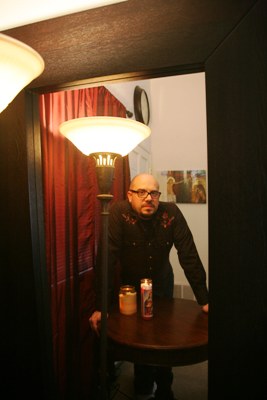 M: Well, let’s talk about some of those songs. I know this is a pretty tough one, but apparently one of the songs you wrote for this record was about a SWAT officer who was killed about a year ago.
M: Well, let’s talk about some of those songs. I know this is a pretty tough one, but apparently one of the songs you wrote for this record was about a SWAT officer who was killed about a year ago.
R: That’s right, one of the songs was about the first SWAT officer killed in the line of duty in the U.S., actually here in Los Angeles. His name was Officer Randal Simmons, and the second song on the record was inspired by his life.
M: And what is that song called?
R: “41-D,” which I believe was how he was identified when he was on the radio, on duty. I heard about the stand-off on the news, and remember hearing that in the end he was slain. Once I started hearing more about who he was I really wanted to honor his life through the music and try to reflect what an incredible man he was. It’s sad in that he passed, but it’s ultimately an uplifting reflection of inspiration through his life. He was a real hero who served on the LAPD to protect your average person in the community for nearly 30 years. He was also very active within the community helping to instill confidence in kids and keep them off the streets through ministry for like 11 years. It’s a real shame we had to lose such a great man who genuinely cared for those people around him, but his life is an inspiration to me and many countless others I’m sure.
M: I think that song is wonderful. It has a sad and melancholy feel, but yet I can hear hope within it as well. The chorus seems almost triumphant to me. What a way to honor his family too.
Alright, let’s talk about another song that I think that’s really great too, it has something to do with space. Isn’t that right?
R: Yes, there is a song on the record called Space.
M: Explain that one.
R: A little while back, I think in the spring of 2007, I was watching the Today show.
M: Shame on you!
R: I know, right?
M: Just kidding.
R: I was watching it and they did this story on Hawking, Dr. Steven Hawking. He is a mathematician and physicist who has done a lot of research on cosmology and black holes, and things like that. Unfortunately, he has some sort of neurological disorder that has left him mostly, if not entirely, paralyzed. He even talks by this sensor that is on his voice box, or something like that. He’s a super intelligent fellow with a brilliant mind. Anyway, apparently some millionaire who was a fan of Hawking decided to treat him to this airplane ride so that he could experience zero gravity. That way Hawking would know how it would feel if he could actually experience going to space. So they took him up in this plane, and there was this footage of them spinning him in zero gravity. He can’t express a lot of emotion because of his disorder, but you could see the joy just gleaming from his eyes in that moment. It completely overwhelmed me to see this, in fact, I’m getting goose bumps talking about it right now! Here you have this guy with this amazing mind who has been physically afflicted by this awful disease, bound to a wheel chair for life and regardless, he’s able to experience extreme joy. I mean how can I complain about not having the latest iPod, or sitting in traffic, or anything? Really, where do I get off complaining? If he can experience joy like that, why can’t I experience such joy in the simply daily things in my own life? I can. I mean I don’t have the challenges that he does, but it’s a tremendous example of perspective, and that guy is right on.
M: One of the parts of the song just exclaims “pure joy”, isn’t that right? I think that’s a pretty powerful part of the song.
R: Yeah, and that’s what I saw on his face, and there’s no reason why I can’t have joy like that.
M: So, how is it working with Michael Knott?
R: No comment.
M: Ok Rick, there’s one other song I wanted to ask you about. It’s a really uplifting number, the first one on the record, called “As Noon.” Could you give us a little information on that one?
R: Sure. The inspiration for that song really came from watching a good friend find his bride. It was awesome to witness him experience such happiness and comfort in discovering her. At the time I was reading Ernest Hemmingway’s The Sun Also Rises, and at the beginning of one of the chapters he is describing this fiesta with these explosions and this magnificent visual display. When I was reading that it made me think of the emotional explosions my friend was experiencing in his life, and how wonderful it was for me to watch all this unfold. What a celebratory time for him, and certainly worthy of such fireworks. He found his soul mate, he found true love, and how brilliant is that! In essence, that’s what I was trying to capture emotionally.
M: That’s great! I heard that you may be doing a video for that song as well. If you do will you share it on YouTube or something like that?
R: I do have a vision for a video for that song that I hope to put out, and it will be available. Hopefully we can get started on it in the next couple of weeks, so we’ll see.
M: I look forward to seeing it.
So let me toss out a few words in an to attempt to describe your music and see if you agree with them: emotional, dissident, melancholy. Is melancholish a word?
R: If it isn’t we are at liberty to make it one.
M: Well, you got a degree in English Literature didn’t you? You should know.
R: Are you not comfortable with my melancholyism? Is that a clinical disorder? If so, I doubt that it’s curable.
M: In your case you’re probably right. Moving on, another descriptive word for your music could be reflective, right?
R: Absolutely, I would agree with all of those descriptions.
M: While your music seems to be all of these things, there are parts that are quite joyful. Part of it seems to flow wherever the emotion wants to flow. I really do enjoy this record, and I was excited to have had a part in it so that it can get out and connect with others. I’m happy to be interviewing you as well to promote it as I feel it is an important record, and that people need to hear and experience it.
I have a question that I like to ask every artist that I interview. Now you being the first artist that I’ve ever interviewed I will ask you the question, I will ask you the question I’ve never asked anyone because I’ve never interviewed anyone else. Do you have a good story from or about the music industry, maybe something that you experienced or witnessed? It could be good, bad, funny, or indifferent. Do you have something to share? I think everyone has something to share about the industry, or a specific experience. Do you have anything like that?
R: I think I might have one. Well, it involves this guy by the name of Michael Knott…
M: No, no, no. Not including me. That’s why I’m doing this interview.
R: If that’s the case then I don’t know if I’ve got anything for you.
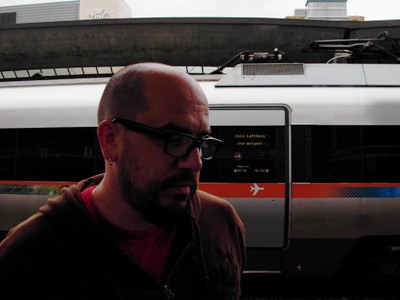
(This image by Brenda Clark, Rick’s wife.)
M: Come on, I know you’ve got something.
R: I tend to try to go to SXSW each year if I can as I love SXSW. This one year I went to go see Goldfrapp, Ray Davies, and Morrissey all at the same venue on the same night. It was a pretty cool line up. After watching Goldfrapp, who put on a good show by the way, I had the chance to get back stage. As I recall, Morrissey was supposed to go on next and Ray Davies was to follow, but Davies was a secret show or something. Someone back stage, I think it was Allison Goldfrapp, had ordered and brought barbecue wings or something like that. Morrissey had a slight problem with that. Apparently he doesn’t like meat, who knew? I guess meat is murder. Anyway, he started verbally going at Goldfrapp, and Ray Davies got into the middle of it. After debriefing with a friend who books shows, apparently Morrissey doesn’t ever want any meat present at the venue that he is playing, and he strictly forbids it.
M: Wow! So what happened?
R: I thought it was going to come down to blows or something.
M: You thought they were going to start punching each other?
R: Yeah, and Davies totally stood up for Goldfrapp as he thought she should have whatever she wanted. Then Davies got so upset that he didn’t want to go on after Morrissey.
M: So Davies didn’t play?
R: Nope, he did not play.
M: You didn’t get to hear Lola?
R: No, it was a bummer as I am a fan of the Kinks. I did get to see Morrissey though, and he put on a good show. I was excited to see him do Girlfriend in a Coma in particular. I suppose it’s as close to the Smiths as I’m ever going to get live.
M: Wow, now that’s a good story!
R: It does make for a good story, doesn’t it?
M: Well Rick, I’m really impressed by your record, the first solo project released by Rick McDonough with one of the coolest titles I’ve heard on a record lately, Breakups and Fur Coats. Can you just tell us briefly any other projects that you may be involved with since you seem as busy as me?
R: Well, obviously I’m working on finalizing your L.S. Underground project.
M: Thank you.
R: It’s an amazing record and I’m really thankful to be part of it. It’s really going to impact a lot of people in a positive way. Then, we’re also working on your next solo project Even Star, which is equally amazing in a very different way. We still have the sophomore release of Struck Last May as well which should be a little bit easier for some to digest.
M: I think you’re right as it’s not quite as experimental as 16 Flowers.
R: Yeah, maybe it’s like turning it back from 10 to something like 7.5 or 8 on the experimental dial.
I’m also trying to wrap up a project with a buddy of mine that I’ve worked with for years who has the most amazing voice. We did a few songs together under the name While Rome is Burning. It’s a two person studio project based on textures, guitars, loops, hooks, and things like that. Then, you have this ethereal sort of hauntingly beautiful vocals that just engulf you. For these songs I presented him with poetry that he would then rework into lyrics. I don’t want to belabor the point, but he has such an amazing voice.
M: He does, and his name is…
R: Peter Kusek. He’s a crazy talented guy, and I’m grateful to be able to work with him. If I had to pick someone’s voice that I appreciate the most it would probably have to be Peter.
M: He does have an amazing voice, I agree completely.
R: It’s going to be a 5 to 7 song e.p., and it’s a pretty exciting collection of songs. I also just started a keyboard-based project. I’m tossing around a couple of ideas as to what I am going to call it, but haven’t settled on one as of this moment. They are textured sound scapes that you could have playing in the background, or like something that you would hear in an indie film, something along those lines. I hope to have that out later this year as well. Then, I’m also playing with a cool indie rock band called Paravell. A friend of mine that I went to university with is the main song writer and front man.
M: Do you guys play out?
R: Yes, we typically try to play a couple of shows a month here locally in Orange County. We have a record out, and we are working on several new songs that we are going to start recording here shortly. I’m pretty excited about that too. I think the songs are really relatable and going to impact people in a good way.
M: Now tell me how people can get a hold of your new record and what it costs.
R: I have it for sale online at hiddenfromblackout.com and its $14.00 with shipping in the U.S. or Canada.
M: A lot of people may not know that you also do painting, photography, writing, all sorts of other creative things aside from the music. Do you ever sell your paintings and photography?
R: I do, but right now it’s more word of mouth.
M: How would someone go about trying to purchase one of your pieces? Would they just have to come to your house?
R: They could by appointment, or during happy hour which is 4-6. Right now I just have a photography blog up that briefly goes over the projects I’m working on or have been hired out for. I hope to display my photography and my paintings that I have for sale soon, but I’m working on it right now. People can get to the photo blog from the Hidden From Blackout site.
M: You are a talented photographer. Your paintings are great, too. I know one of your last series was a Napa Valley series of the vineyards there. How many did you paint in that series?
R: I did something like 14 in that series, but I’d say that less than half of them are officially finished. Isn’t that typical for an artist, nothing is ever finished.
M: Maybe you’ll have it set up for people to see those paintings in the next month or two?
R: I hope I can at least get a link up that connects from the Hidden From Blackout site.
M: Well thanks Rick, in conclusion is there anything else that you would like to say?
R: I can’t think of anything aside from thanks, brother.

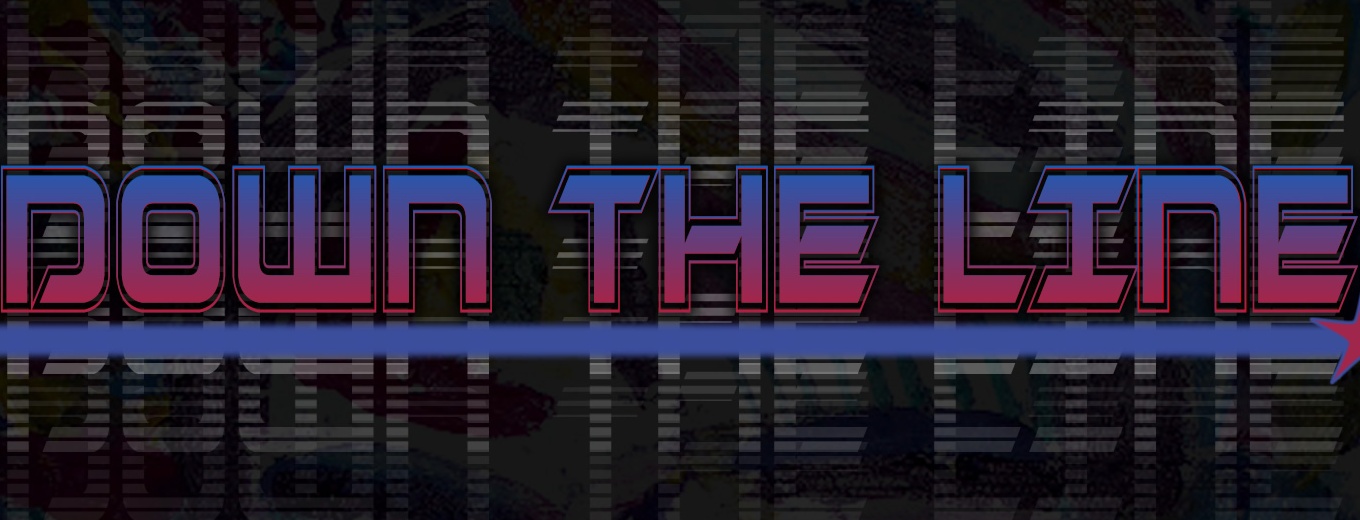
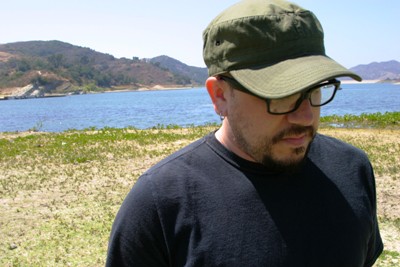
Leave a Reply